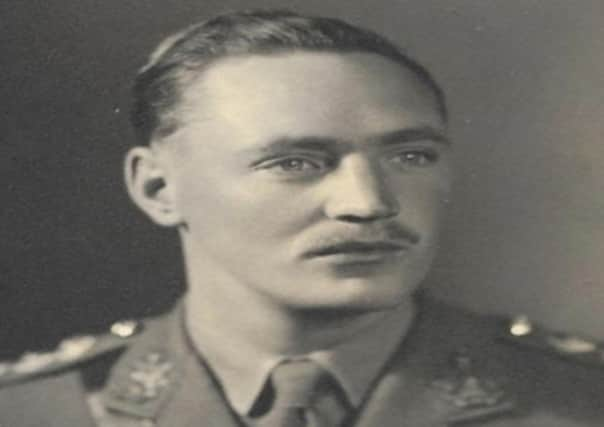Obituary: Thomas Hermiston, Chindit soldier who endured gruelling conditions operating behind enemy lines


Thomas Mack Hermiston, teacher and Chindit. Born: 23 September, 1916. Died: 3 April 2020 aged 103
Thomas Hermiston was one of the last surviving Chindits, a tenacious brand of special forces whose legendary endurance behind enemy lines helped drive the Japanese from India and Burma during the Second World War.
Advertisement
Hide AdAdvertisement
Hide AdRenowned for their fortitude and ability to withstand appalling conditions, they faced the worst fighting experience of any Allied infantry and their legacy remains an inspiration today – a byword for bravery, symbolised by the lion of their Chindit flash.
Hermiston, a child of the Great War, had been a soldier for almost a decade before he became a Chindit, the unit conceived by Major-General Orde Wingate as a long range penetration force to harass the enemy.
As part of 4th Battalion Border Regiment, which made up two columns of the Chindits’ 23rd Brigade, he saw active service in Operation Thursday, disrupting communication lines behind Japanese divisions, attacking Imphal and Kohima in north-east India, near the Burmese border.
Commanding Column 34, he and his men patrolled around Ukhrul in Manipur, attacking supply lines and capturing Japanese troops.
Hermiston was at the forefront of these operations, often leading recce patrols in advance of his column and under the constant threat of enemy ambush.
The Japanese were ferocious fighters and a formidable foe. But the Chindits also waged an ongoing battle against the elements.
Living in some of the world’s most challenging terrain, the unconventional band operated in jungle and hill country, in extreme humidity and temperatures of more than 100F. Relying solely on air-dropped rations, they often went days without food. In monsoon season the incessant rain rotted their clothes and many perished from malaria and scrub typhus.
To make matters even more arduous they each carried upwards of 80lbs of possessions and weapons on their back – half their own bodyweight – and slept in the open where they could. They shed stones within weeks and by the time they left the battlefield were walking shadows of their former selves.
Advertisement
Hide AdAdvertisement
Hide AdAlmost all were hospitalised and most suffered Chindit Syndrome – a combination of two or three conditions such as malaria, dysentry and septic jungle sores which stood no chance of healing in the humidity. Few could stomach solid food.
But Hermiston was no stranger to adversity. The third of four children to Leith Docks porter Andrew Hermiston and his wife Isabella, his mother died following the birth of his younger brother.
The two boys were separated from their older brother and sister and spent much of their early life in care.
Educated at Broughton School, Leith Senior School and Leith Academy, and despite being well looked after, he and a friend decided to run away to America to make their fortunes.
The adventure was short-lived as they got on the wrong train in Glasgow, ended up in Airdrie and were apprehended by police.
At 13 he and his brother were fostered by an Aberdeenshire family at Craighead near Huntly where he later worked on a farm and in forestry. In 1934, aged 18, he joined the Gordon Highlanders and while posted to Aldershot took a gruelling Physical Training instructor course. An athletic sportsman – he played football, rugby and was a medal-winning army boxer – the move would to equip him well for the future.
Mobilised to Cherbourg, France on his 23rd birthday, just five days after marrying his childhood sweetheart, Louise Rough from Aberdeenshire, he went on to help defend the Belgian border before being attached to the Kings Shropshire Light Infantry.
The following year he was recalled from France to Dover where he was commissioned as a 2nd lieutenant into the 4th Battalion Border Regiment and posted to Kington Camp, near Hereford. He later sailed to the Middle East on the SS Orontes prior to taking part in the Burma campaign.
Advertisement
Hide AdAdvertisement
Hide AdThough he spoke little of his own war, he often remarked on the bravery of the men he commanded and served with and of how lucky he felt to return from the conflict.
He left the army with the rank of major in 1947 and became a PE teacher at Broughty Ferry’s Grove Academy, later moving to Dundee’s Morgan Academy as head of PE.
There he ensured they had a wide choice of sports, from football and rugby to volleyball, and was widely credited with bringing basketball to Dundee where the regional Tom Hermiston Cup is still contested each year. He was also commanding officer of Morgan Academy’s cadet force.
Hugely respected by pupils, some of whom kept in touch for years, he is remembered as inspirational, disciplined but fair, a mentor who urged them to give 110 per cent and to be the best they could be.
Stoic and indefatigable, at the age of 97 and after 12 weeks in traction, he taught himself to walk again after breaking his femur. Still tenacious and sharp as a tack, he had been determined to return home. He achieved his wish, living alone in his own home until his death.
Predeceased by his wife Louise in 1990 and their son Gordon in 2013, he is survived by their daughter Zena, daughter-in-law Patricia, grandchildren Lesley and Andrew and great grandchildren.
ALISON SHAW